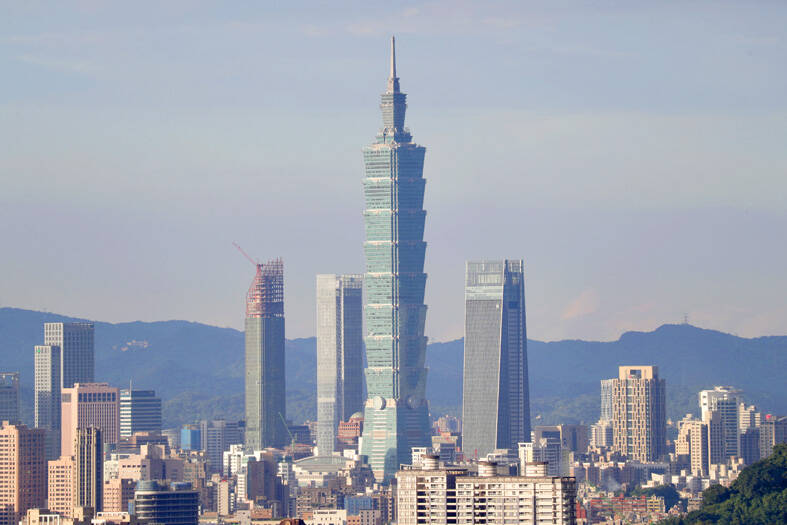Disappointing export figures have prompted the Chung-Hua Institution for Economic Research (CIER, 中華經濟研究院) to cut its economic growth forecast for the nation for this year to 1.6 percent from its previous estimate of 2.01 percent made in April.
“Taiwan’s economy will have difficulty growing 2 percent this year due to poor exports,” CIER president Yeh Chun-hsien (葉俊顯) told a news conference in Taipei yesterday.
Exports, the main growth driver of the local economy, have contracted for the past 10 months on an annual basis without any sign of recovery in the near future, the Ministry of Finance said earlier this month.

Photo: Ritchie B. Tongo / EPA-EFE
The Taipei-based think tank predicted that exports would shrink 7.13 percent from a year earlier this year, while imports would decrease by 9.97 percent.
Private investment, another major GDP component, would also prove a drag, with a 1.36 percent annual decline estimated for this year, as firms practice frugality and shun investment to mitigate the pain of sluggish business, Yeh said.
As a result, private consumption and government expenditures would become the major forces bolstering the nation’s economy, he said.
Faltering global demand for Taiwan-made goods and inventory destocking by firms have led several research institutions including CIER to downgrade the nation’s GDP growth forecast for this year to below 2 percent.
The Directorate-General of Budget, Accounting and Statistics could join the trend of downward revisions when it updates its growth forecast next month, after predicting 2.04 percent growth in May.
Chu Jung (儲蓉), a risk control chief at Farglory Life Insurance Co (遠雄人壽) and a business management professor, is more pessimistic, warning that Taiwan might struggle to eke out 1 percent GDP growth in light of weak economic data.
Poor exports have historically had a negative impact on domestic demand.
National Central University economics professor Yau Ruey (姚睿) shared the cautious sentiment, saying there is a limit to the growth momentum in private consumption.
It remains to be seen how long revenge consumption will be sustained if exports continue to suffer, analysts have said.
China is a key market for Taiwan’s exports and the economic slowdown in China poses a challenge, which has accounted for Taiwan’s declining reliance on the Chinese market, Yau said.
CIER expects consumer prices to grow 2.1 percent this year, slightly higher than the central bank’s 2 percent target. The job market would hold resilient with an unemployment rate of 3.59 percent, the institute said.
The think tank said Taiwan’s economy could grow 0.48 percent in the second quarter and 2.41 percent in the third before rebounding to 6.11 percent in the fourth quarter, as inventory adjustments are expected to come to an end while demand for artificial intelligence products is rising.

Taiwan will prioritize the development of silicon photonics by taking advantage of its strength in the semiconductor industry to build another shield to protect the local economy, National Development Council (NDC) Minister Paul Liu (劉鏡清) said yesterday. Speaking at a meeting of the legislature’s Economics Committee, Liu said Taiwan already has the artificial intelligence (AI) industry as a shield, after the semiconductor industry, to safeguard the country, and is looking at new unique fields to build more economic shields. While Taiwan will further strengthen its existing shields, over the longer term, the country is determined to focus on such potential segments as

UNCERTAINTY: Innolux activated a stringent supply chain management mechanism, as it did during the COVID-19 pandemic, to ensure optimal inventory levels for customers Flat-panel display makers AUO Corp (友達) and Innolux Corp (群創) yesterday said that about 12 to 20 percent of their display business is at risk of potential US tariffs and that they would relocate production or shipment destinations to mitigate the levies’ effects. US tariffs would have a direct impact of US$200 million on AUO’s revenue, company chairman Paul Peng (彭雙浪) told reporters on the sidelines of the Touch Taiwan trade show in Taipei yesterday. That would make up about 12 percent of the company’s overall revenue. To cope with the tariff uncertainty, AUO plans to allocate its production to manufacturing facilities in

COLLABORATION: Given Taiwan’s key position in global supply chains, the US firm is discussing strategies with local partners and clients to deal with global uncertainties Advanced Micro Devices Inc (AMD) yesterday said it is meeting with local ecosystem partners, including Taiwan Semiconductor Manufacturing Co (TSMC, 台積電), to discuss strategies, including long-term manufacturing, to navigate uncertainties such as US tariffs, as Taiwan occupies an important position in global supply chains. AMD chief executive officer Lisa Su (蘇姿丰) told reporters that Taiwan is an important part of the chip designer’s ecosystem and she is discussing with partners and customers in Taiwan to forge strong collaborations on different areas during this critical period. AMD has just become the first artificial-intelligence (AI) server chip customer of TSMC to utilize its advanced

Chizuko Kimura has become the first female sushi chef in the world to win a Michelin star, fulfilling a promise she made to her dying husband to continue his legacy. The 54-year-old Japanese chef regained the Michelin star her late husband, Shunei Kimura, won three years ago for their Sushi Shunei restaurant in Paris. For Shunei Kimura, the star was a dream come true. However, the joy was short-lived. He died from cancer just three months later in June 2022. He was 65. The following year, the restaurant in the heart of Montmartre lost its star rating. Chizuko Kimura insisted that the new star is still down